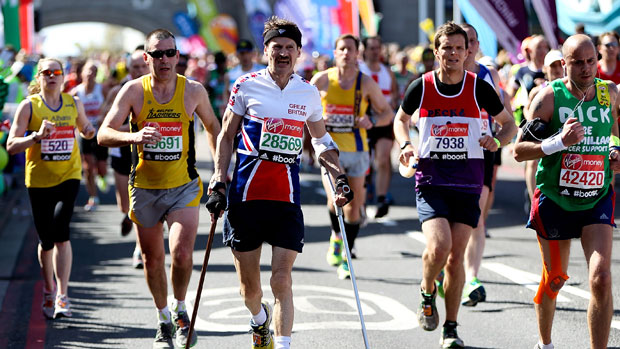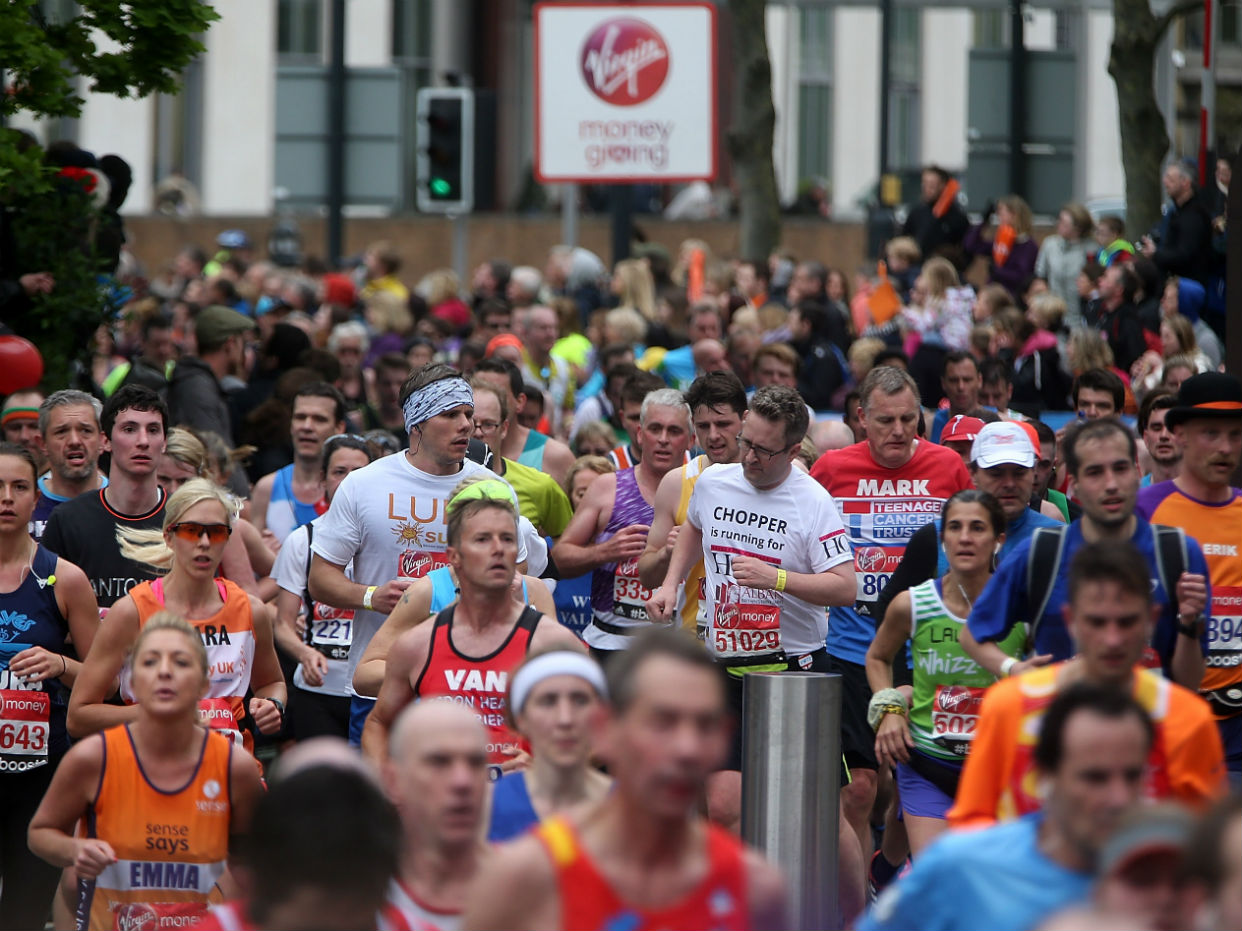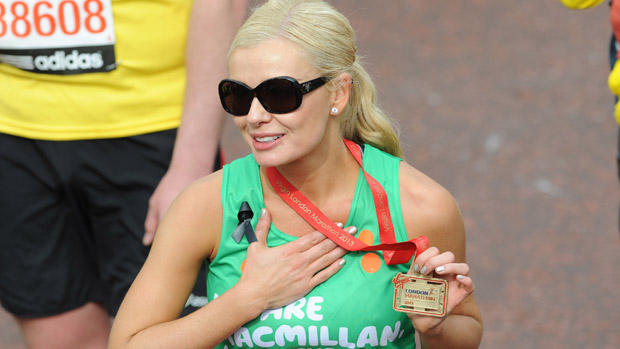London Marathon deaths: is it safe to run 26 miles?
The long-distance run, which takes place on Sunday, has claimed the lives of 12 people in its history

A free daily email with the biggest news stories of the day – and the best features from TheWeek.com
You are now subscribed
Your newsletter sign-up was successful
On Sunday, tens of thousands of professional and amateur runners will hit the streets of Britain's capital for the London Marathon, one of the world’s most prestigious long-distance running races.
But while any doctor can tell us the benefits of exercise, there are some experts who believe that marathon-length runs - just over 26 miles - are too extreme for the average runner, and can be dangerous.
Virgin, which sponsors the London Marathon, says that “running is good for the heart” and stresses that more than one million people have safely completed the marathon in its 38-year history, but acknowledges that there have still been “several fatalities from serious heart disease in runners apparently unaware that they had a problem”.
The Week
Escape your echo chamber. Get the facts behind the news, plus analysis from multiple perspectives.

Sign up for The Week's Free Newsletters
From our morning news briefing to a weekly Good News Newsletter, get the best of The Week delivered directly to your inbox.
From our morning news briefing to a weekly Good News Newsletter, get the best of The Week delivered directly to your inbox.
Since the first event in 1981, a total of 12 participants have died, the most recent of whom was former Masterchef semi-finalist Matt Campbell.
Campbell collapsed and died during last year’s marathon, when temperatures hit an all-time high for the event.
This news was followed just a few months later by reports that two men had died after collapsing at the finish line of the Cardiff Half Marathon in October 2018.
The competitors, aged 25 and 32, “went into cardiac arrest after crossing the finishing line within three minutes of each other, at about 12.25pm”, reports the BBC.
A free daily email with the biggest news stories of the day – and the best features from TheWeek.com
Given the number of people who take part in such races each year, just how dangerous is long-distance running?
How safe are marathons?
The BBC reports that most of the casualties that occur during a race concern minor injuries, like pulled muscles, sprains and strains. These tend to heal quickly and on their own.
The broadcaster adds that dehydration is the biggest problem that marathon runners have to overcome. “In a hard race on a hot and humid day, up to four litres of fluid can be lost through sweating and exhalation,” it says. “It is important for runners to keep well hydrated.”
But an increasing number of studies are now linking long-distance running with sudden heart conditions and issues that were undetected previously, even if there is no family history of similar health issues.
In a study published in December in the journal Circulation, researchers in Spain revealed that full marathons may put significant strain on the heart. In order to do this, the team measured substances that can signal stress and found higher levels in runners who covered the classic 26.2 mile (42.2 kilometres) marathon distance compared with those who raced shorter distances such as a half-marathon or 10K, Health24 reports.
A study presented to the American College of Cardiology in 2009 found that the risk of sudden death during a marathon is 0.8 per 100,000 people. By comparison, the report found that triathlons – which ask users to complete three sequential endurance races in swimming, running and cycling – have a significantly higher risk of sudden death at 1.5 in 100,000. To put this into perspective, the risk of dying in childbirth in the UK in 2012 was 8.6 in 100,000 births, according to The Daily Telegraph.
How does it affect the heart?
A number of independent studies have found that marathons appear to cause damage to the heart in the short term, but researchers are unsure whether the effects are lasting. Some note that there are cardiovascular advantages to regular running. “Being fit is protective,” Dr James Freeman, a fellow in cardiovascular medicine at Stanford University School of Medicine told The New York Times. Professor Sanjay Sharma, medical director for the London Marathon, told the BBC that most people who have died during the London marathon have had previous heart conditions or heart disease.
Should we be worried?
Research published in the New England Journal of Medicine looked at 11 million runners who had completed marathons and half-marathons between 2000 and 2010. Over the decade, 59 of the runners had heart attacks, of which 42 died, which led the NEJM to conclude that “marathons and half-marathons are associated with a low overall risk of cardiac arrest and sudden death”.
A study carried out by Canadian researchers found that running long distances may cause temporary damage to the heart, but that any ill-effects are likely to be short-lived. “I don’t think most people who are going to run a marathon need to worry,” Davinder Jassal, an assistant professor of cardiology, radiology and physiology involved with the research told The New York Times. “The indications are that nothing serious is going on.”
But Judy O’Sullivan, senior cardiac nurse at the British Heart Foundation, emphasises the need for proper training and says people should consult their doctors if they have any worries. “We would always advise anyone who has any concerns to visit their GP before taking part,” she said.
A recent study published in the European Heart Journal recommended that marathon runners and other endurance athletes have their hearts tested while active to avoid potential sudden death while training or competing.
Professor Andre La Gerche and his colleagues in Australia and Belgium found that problems in the way the heart’s right ventricle works become apparent only during exercise and cannot be detected when an athlete is resting.
-
 Why are election experts taking Trump’s midterm threats seriously?
Why are election experts taking Trump’s midterm threats seriously?IN THE SPOTLIGHT As the president muses about polling place deployments and a centralized electoral system aimed at one-party control, lawmakers are taking this administration at its word
-
 ‘Restaurateurs have become millionaires’
‘Restaurateurs have become millionaires’Instant Opinion Opinion, comment and editorials of the day
-
 Earth is rapidly approaching a ‘hothouse’ trajectory of warming
Earth is rapidly approaching a ‘hothouse’ trajectory of warmingThe explainer It may become impossible to fix
-
 Man to walk marathon backwards
Man to walk marathon backwardsfeature And other stories from the stranger side of life
-
 Blind mystic ‘foresaw Donald Trump’s illness’
Blind mystic ‘foresaw Donald Trump’s illness’Speed Read And other stories from the stranger side of life
-
 Cardiff shoppers stuck in lift that climbed and plunged for 40 minutes
Cardiff shoppers stuck in lift that climbed and plunged for 40 minutesIn Depth Ordeal in Wales likened to horror film scene
-
 Halloween events 2019: 18 top things to do in London and the UK
Halloween events 2019: 18 top things to do in London and the UKIn Depth From ghost tours to zombie paintballing, there’s something for everybody this year
-
 Katherine Jenkins keeps it 'classy' after marathon jibes
Katherine Jenkins keeps it 'classy' after marathon jibesSpeed Read Welsh singer responds to columnist who called her participation in London race an act of 'self-interest'